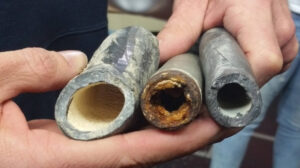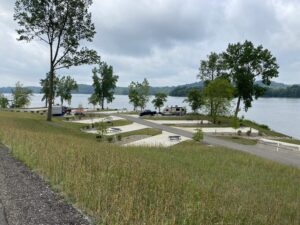
INDUSTRY TRENDS
Ecology in the Winter?
March 6, 2019 | WRITTEN BY: Carmen
Written by: Corey Czinger
Do you ever wonder what an ecologist does in the winter? You may think our workload slows down and we go into hibernation, but that isn’t quite the case. Ecologists study the connection between wildlife and their surroundings during every season. Not all plants and animals sleep through the winter, especially when the winters are mild, and neither do we! In order to protect sensitive habitats and to ensure compliance with regulations, ecologists must be active year-round.

For example, in nearly eight inches of snow, I installed wetland fencing to identify and protect two wetlands from the demolition of nearby buildings. This was the beginning of the expansion process for the City of Hudson’s First and Main development to provide a continuation of office, residential and retail space. However, before this space can be redeveloped, the buildings have to be demolished and the site must be cleaned up. Before demolition and cleanup can happen, wetland fencing had to be put up to protect the wetlands from construction activities. Identifying wetlands is important for construction personnel to ensure violations of the Clean Water Act don’t inadvertently occur. The City of Hudson wanted to protect these wetlands for many reasons:
- Wetlands act as sponges, soaking up excess water to prevent flooding
- Wetlands act as a filter system, improving water quality through sediment trapping, gathering pollutants and even catching pathogenic diseases
- Wetlands provide habitats for animal and plant species to thrive and adapt to their pertained ecosystems

Throughout the winter months, ecologists remain busy with environmental site assessments, surface water and stream assessments, ecological surveys, wetland delineations, environmental sample collection, mapping and permitting and grant writing. Even though they’re more difficult to achieve in the winter months, ecological tasks occur year-round. Winter can also be a great opportunity to prepare for projects and clients that will require your services in the spring and summer time. Desk-based work is just as vital to the success of a project as field work. Winter is a good time for ecologists to catch up on reviews, surveys, data analysis and permitting for clients. Ecological services are needed all year and just like ecology, we adapt to our seasonal changes.

The cool thing about being an ecologist is you get to work outside, directly with the environment. Even through the cold weather, you bundle up, grab your soil probe and identification books, and get out there to be the best ecologist you can be. Spring will be here before you know it. But for now, we will still be hard at work during the winter!
RELATED TAGS:
[xyz-ips snippet=”comment-form”]




